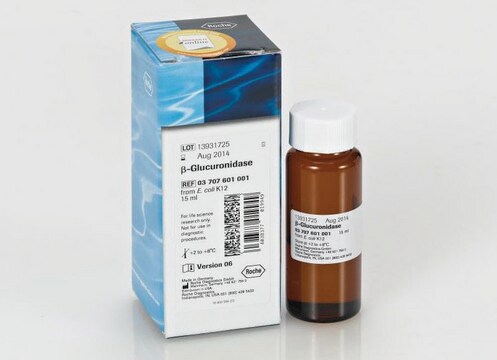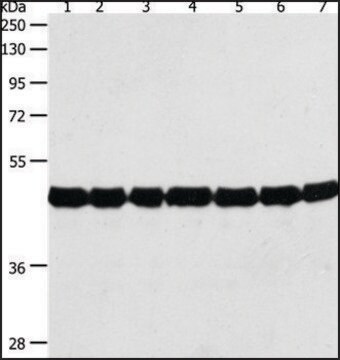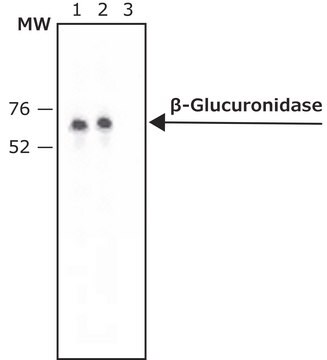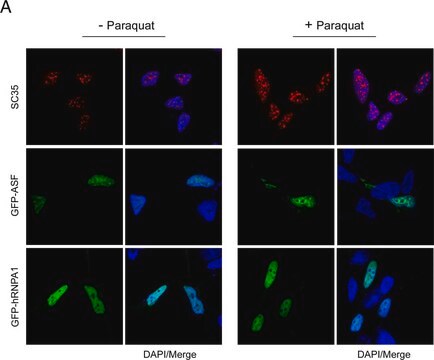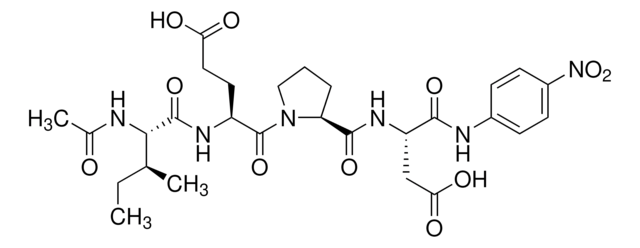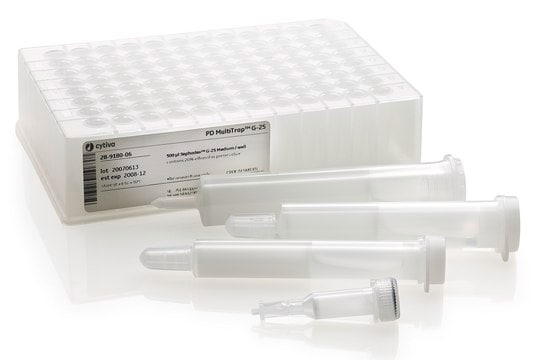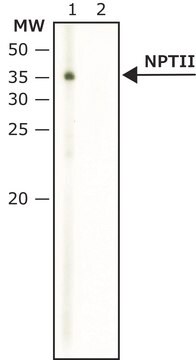推薦產品
生物源
rabbit
品質等級
共軛
unconjugated
抗體表格
affinity isolated antibody
抗體產品種類
primary antibodies
無性繁殖
polyclonal
形狀
buffered aqueous solution
分子量
antigen 60 kDa
物種活性
plant
濃度
~1.5 mg/mL
技術
western blot: 1-2 μg/mL using purified GUS from E. coli
運輸包裝
dry ice
儲存溫度
−20°C
目標翻譯後修改
unmodified
一般說明
β-Glucuronidase (GUS) gene (also referred to as uidA) from Escherichia- coli, codes for a 60kDa protein.
特異性
Anit-β-Glucuronidase (C-Terminal) recognizes bacterial GUS expressed in transgenic tobacco plants.
The antibody recognizes bacterial GUS expressed in transgenic tobacco plants.
免疫原
synthetic peptide corresponding to amino acids 589-603 at the C-terminus of E. coli GUS, conjugated to KLH.
應用
Detection of GUS by immunoblotting (60 kDa). Staining of the GUS band in immunoblotting is specifically inhibited by the immunizing GUS peptide (E. coli, amino acids 589-603).
生化/生理作用
β-Glucuronidase (GUS) acts as a reporter gene for plant studies. Reporter genes are widely used for studying the expression of foreign genes in transformed plant tissues. GUS is an hydrolase that catalyzes the cleavage of a variety of β-glucuronide derivatives available for colorimetric, fluorometric and histochemical assays. GUS activity is easily assayed in vitro and can withstand fixation, enabling histochemical localization in cells and tissue sections. However, one of the major limitations of the gus reporter gene system is that the histochemical GUS assay system is destructive for the plant tissue, and therefore it is not suitable for direct visual selection of transformed plants.
外觀
0.01M 磷酸缓冲盐溶液,pH 7.4,含 15mM 叠氮化钠。
準備報告
The antibody is affinity-purified using the immunizing peptide immobilized on agarose.
免責聲明
Unless otherwise stated in our catalog or other company documentation accompanying the product(s), our products are intended for research use only and are not to be used for any other purpose, which includes but is not limited to, unauthorized commercial uses, in vitro diagnostic uses, ex vivo or in vivo therapeutic uses or any type of consumption or application to humans or animals.
未找到適合的產品?
試用我們的產品選擇工具.
儲存類別代碼
10 - Combustible liquids
水污染物質分類(WGK)
WGK 3
閃點(°F)
Not applicable
閃點(°C)
Not applicable
Benjamin Dugdale et al.
The Plant cell, 25(7), 2429-2443 (2013-07-11)
In this study, we describe a novel protein production platform that provides both activation and amplification of transgene expression in planta. The In Plant Activation (INPACT) system is based on the replication machinery of tobacco yellow dwarf mastrevirus (TYDV) and
Mark D Harrison et al.
Plant biotechnology journal, 9(8), 884-896 (2011-03-02)
A major strategic goal in making ethanol from lignocellulosic biomass a cost-competitive liquid transport fuel is to reduce the cost of production of cellulolytic enzymes that hydrolyse lignocellulosic substrates to fermentable sugars. Current production systems for these enzymes, namely microbes
Sebastian N W Hoernstein et al.
Molecular & cellular proteomics : MCP, 15(6), 1808-1822 (2016-04-14)
Protein arginylation is a posttranslational modification of both N-terminal amino acids of proteins and sidechain carboxylates and can be crucial for viability and physiology in higher eukaryotes. The lack of arginylation causes severe developmental defects in moss, affects the low
Biolistic-mediated genetic transformation of cowpea (Vigna unguiculata) and stable Mendelian inheritance of transgenes
Ivo Nayche L, et al.
Plant Cell Reports, 27(9), 1475-1483 (2008)
Transgenic Plants: Gene Constructs, Vector and Transformation Method
New Visions in Plant Science (2018)
我們的科學家團隊在所有研究領域都有豐富的經驗,包括生命科學、材料科學、化學合成、色譜、分析等.
聯絡技術服務